Last week, Xpress ventured south to highlight conservation work and economic development along the French Broad River in Transylvania and Henderson counties. This week, we look at the network of agencies and organizations working in Buncombe and Madison counties to improve water quality and position the French Broad as the region’s next great tourist attraction.
Placidly meandering into Buncombe County near the Asheville Regional Airport, the character of the French Broad River changes upon reaching Asheville: Rocky and rough, the river drops 714 feet in 43 miles as it courses northwest through a narrow corridor in Buncombe and Madison counties to the Tennessee line near Paint Rock.
From a sludge that author Wilma Dykeman famously declared “too thick to swim in and too thin to plow,” this section of the French Broad has been transformed into a regional mecca for outdoor enthusiasts and tourists. Asheville’s formerly derelict waterfront, meanwhile, has undergone a renaissance, attracting a host of new businesses and several major infrastructure upgrades over the past decade.
The river’s resurgence comes at the hands of local organizations, government agencies and residents banding together to revitalize the corridor. While challenges to water quality still remain, the French Broad is quickly becoming a key cog in the life and culture of the city once more.
Learning from past mistakes
For much of the 20th century, the French Broad River was Asheville’s industrial hub and unofficial dumping ground. That began to change with the publication of Dykeman’s 1955 book The French Broad, which decried the pollution and inspired a new generation of river advocates like Karen Cragnolin, who founded the nonprofit advocacy organization RiverLink in 1987.
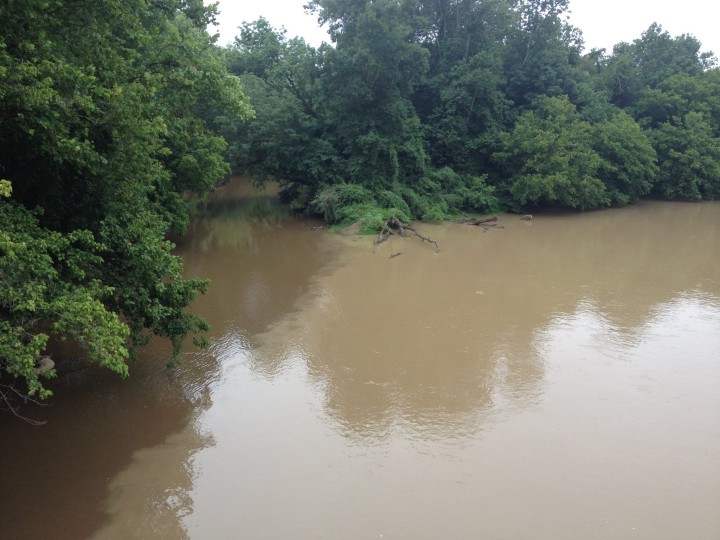
Formed in partnership with the Asheville Area Chamber of Commerce, RiverLink touted the potential of the French Broad to become a centerpiece of tourism in the city. This mindset has guided the nonprofit’s expansion into its current-day status as a regional promoter of the river, says Executive Director Garrett Artz. “We’re really looking at the eight-county watershed [these days],” he says. “What’s in those eight counties, what streams are worth prioritizing and what we should address.”
With more impervious surfaces and roadways around Asheville than other areas of the watershed, stormwater runoff is a big contributor to contaminants entering the river here, Artz says. “The water comes off really fast from those roads, and oftentimes has grime and whatever other pollution on it that gets carried off with the stormwater.” With nowhere else to go, stormwater can also damage streambeds during heavy rains, contributing to erosion. (See “Climate Change, Aging Infrastructure and Rapid Development Fuel Asheville Stormwater Woes,” June 2, Xpress)
One of RiverLink’s current projects to protect water quality in the French Broad is a joint effort involving Givens Estates Retirement Community, Asheville-based Robinson Engineering, researchers from Western Carolina University and N.C. State University.
In addition to reducing the amount of stormwater running off the steep slopes and paved surfaces of the Givens complex into nearby Dingle Creek, Artz says the project will help develop better standards for stormwater management in the mountains. “When the engineers do stormwater management here, they’re using data collected in the Piedmont and Coastal Plains,” he notes. “We hope [The Givens project] will inform some better standards for how to treat stormwater here.”
Web of water stewards
Charged with monitoring the North Carolina section of the French Broad watershed, Riverkeeper Hartwell Carson and his team investigate, identify and address point and nonpoint sources of pollution entering the French Broad.
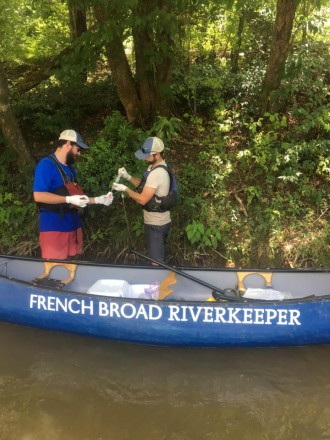
While he’s noticed a decrease in the amount of trash in the river over his 12 years as riverkeeper, the water quality around Asheville “sort of goes up and down,” Carson admits. “It’s better than it was historically, 20 or 30 years ago, but I don’t know that it’s a ton better over the last 10 years.”
This lack of recent progress can be attributed, in part, to a lack of enforcement of construction regulations, he adds. “Prior to the Great Recession, there was some work to try and ramp up enforcement and monitoring around sediment,” Carson says. But with construction picking up again, combined with cuts to the Division of Water Quality’s budget, the burden has largely fallen on grassroots agencies to monitor the river.
According to an Aug. 11 article in U.S. News & World Report, “Since 2013, 70 positions have been eliminated from the N.C. Department of Environmental Quality, specifically those that oversee water permitting, compliance and enforcement.” Other news reports also document large reductions in the department’s staff.
To aid Carson’s efforts in tracking where sediment is coming from, environmental nonprofit MountainTrue has established a “muddy water watch” network of volunteers. “We train folks about erosion problems, and we have an app that folks can use to report those issues, take pictures, send it to the appropriate regulator,” Carson says.
Among local government agencies, the Buncombe County Soil and Water Conservation District works to “help people help the land,” says agency director Gary Higgins, through a mix of technical assistance to individuals and groups, education and cost-share programs for local landowners to address erosion and related water quality issues.
“The water quality in a watershed is heavily dependent on what each landowner does on their own land,” says Higgins, a Buncombe native who grew up near the river in Alexander. “The decisions a landowner makes regarding their land management has a direct impact on other landowners downstream and the health of the watershed.”
Keeping tabs on trash
While many local organizations focus on what’s in the water, Asheville GreenWorks has set its sights on surface-borne pollutants. The nonprofit runs over 200 projects a year and involves about 3,200 volunteers. Each summer, around 40 river cleanup projects yield 10 to 15 tons of trash removed from the river.
That last number might sound large, says Eric Bradford, GreenWorks’ director of operations, but is actually down from previous years, a reduction he attributes to more community involvement in river cleanups and easier access to waste disposal.
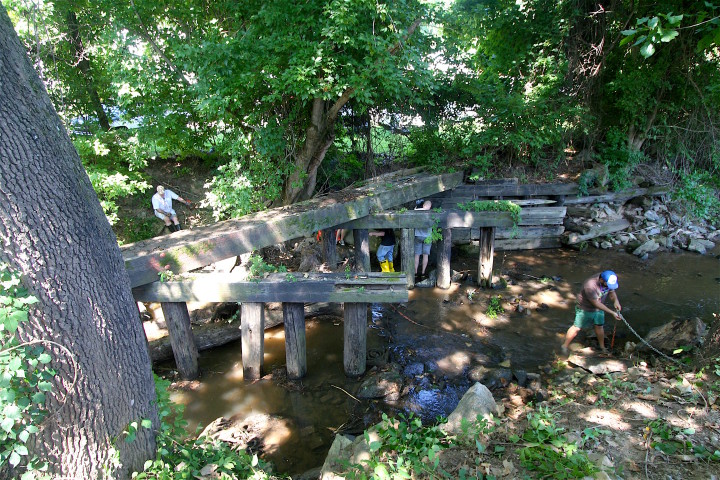
Despite this improvement, Bradford, like Carson, is frustrated by the lack of environmental enforcement at the state level. “The legislature’s actually going in the opposite direction with regulatory measures,” he alleges, citing actions like the passage of House Bill 74 in 2013, which allows waste collectors use leak-resistant, rather than leak-proof, vehicles, potentially allowing harmful liquids to escape from garbage trucks. “It could be Drano, gasoline, whatever — now they’re able to leak it out of their trash vehicles as they’re traveling around your neighborhood.”
GreenWorks is also compiling statistics on surface-borne refuse, using data collected from projects like the organization’s trash boom and trash trout devices (See “Of Grime and the River,” Aug. 9, Xpress) “We know that 75 percent of the surface-borne litter that’s in the river comes from the roadside,” Bradford says. “Everytime it rains, this litter is swept into our storm drain systems and piped into our local streams. We would like to see if that number’s changing locally.”
Bradford and other representatives from GreenWorks plan to meet with Buncombe County officials in the coming weeks to discuss the possibility of implementing additional trash trout devices in Hominy Creek and other waterways in the Asheville area.
For the VWIN
Knowing what’s in a waterway — and the beneficial native insects and bacteria that might be missing from it — are essential pieces of information for the organizations and agencies working to improve the French Broad. The linchpin to collecting and analyzing this data is the Environmental Quality Institute, which provides sample testing to a host of local partner organizations.
“EQI partners with regional entities who are interested in water quality in their focus areas,” says the nonprofit’s executive director, Ann Marie Traylor. “For example, Buncombe County MSD [Metropolitan Sewerage District] wants to keep an eye out for sewer breaks; MountainTrue, RiverLink and Asheville GreenWorks want to engage the public in keeping an eye on specific urban Asheville streams; Buncombe County SWCD [Soil and Water Conservation District] uses the data to inform their technical assistance and sedimentation/nutrient management programs, as well as stormwater and erosion control.”
The organization also collects samples at approximately 160 fixed sites across Western North Carolina through its Volunteer Water Information Network. “We analyze the samples for eight parameters, including orthophosphate, ammonia, nitrates, pH, alkalinity, conductivity, turbidity and total suspended solids,” says Traylor, “and do a couple other tests as needed, such as fecal coliform and total phosphorus.”
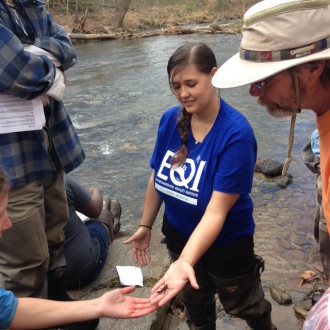
The group’s stream monitoring initiative, meanwhile, keeps tabs on the health of bugs, snails and other critters in local waterways. “The diversity and types of invertebrates present in a stream tell a lot about the habitat and water quality,” says Gracia O’Neill, who heads the initiative. “They can help us detect disturbances beyond the limited analyses we run for VWIN.”
While water quality has remained relatively stable upstream of Asheville, it has, on average, worsened slightly around the city in recent years, according to EQI’s data. “Some of that is likely due to the stormwater runoff from urban Asheville during very heavy rainfall and flooding in late 2015 and early 2016,” Traylor says. North of Asheville, conditions vary from tributary to tributary. “Watersheds like Newfound, Sandy Mush and South Turkey creeks are some of the poorest quality streams of all VWIN sites,” Traylor says. “Ivy River and Reems Creek are among the best.”
The institute’s test results have yielded immediate impacts as recently as this year. Alarmed by high conductivity values — which can indicate the presence of dissolved salts and other inorganic materials — in Ross Creek after a January snowstorm, the group worked with Buncombe County to develop more efficient practices for applying road salts along nearby Tunnel Road and Interstate 240.
Trickle-down economics
Maintaining the health of the French Broad River is imperative as the river becomes a focal point for the city’s economic and tourist economy. “The river has been a catalyst for entrepreneurism,” says Stephanie Pace Brown, executive director of the Buncombe County Tourism Development Authority. “As we’ve been able to attract a big customer base of people who are interested in outdoor experiences, it has helped to support a wide range of outfitters, guides and manufacturers who are selling water-related kinds of equipment.”
Local startup companies like Bellyak and Astral have made a splash manufacturing outdoor gear, while at least three separate tubing companies operate out of Buncombe County alone. In addition, restaurants and bars like The Bywater, Salvage Station and Smoky Park Supper Club rely on their proximity to the French Broad to draw customers in. In 2016, New Belgium Brewing Co. joined the party, opening its East Coast facility on a former livestock auction site in the River Arts District.
At the same time, the city of Asheville has partnered with the Tourism Development Authority, RiverLink and other local agencies to fund remediation of riverfront property and add greenways, boat access ramps and park space in the river district. These efforts, in turn, have transformed the river into a popular hangout for tourists and locals alike: According to RiverLink, nearly 50,000 people float, tube and paddle through the Asheville section of the French Broad each year.
“It’s one of those places where visitors and locals mix,” Brown says. “You can’t tell who’s who: Everybody’s in the tube, and they’re wet. I think it’s a good melting pot that way.” The French Broad’s increasing popularity has also yielded benefits for neighborhoods that surround it. Two federal transportation improvement grants awarded in the past decade will help fund infrastructure and roadway improvements to make Asheville’s riverfront more accessible.

“We have awarded a total of $3.5 million of TPDF [Tourism Product Development Fund proceeds] to the city of Asheville for projects connected with its riverfront redevelopment,” Brown says, including $2.5 million in the River Arts District alone. Farther downstream, the authority recently approved $2.5 million in grants to support the Woodfin greenway, blueway and whitewater wave project. (See “Can the Woodfin Greenway & Blueway beat the odds?” Aug. 4, Xpress)
“By being able to provide those amenities through Woodfin, it helps to disperse that capacity and helps to maintain a more enjoyable experience,” says Brown. “Water doesn’t restrict itself to one municipality, so it has to be a priority for everybody, and it will not be a priority for anybody if people don’t use it.” (Still to come: a report on improvements to the sewage waste treatment plant on the banks of the river downstream from the proposed Woodfin greenway in an upcoming issue of Xpress)
Raising the next generation
Public confidence in the French Broad’s water quality improvements is easily undermined. As recently as July, an article on E. coli counts in the river that appeared on local television station WLOS News 13’s website was widely shared on social media, even though the article dated from 2014.
“A lot of people read something about Asheville’s water quality, and they don’t realize I’m upstream,” says David Whitmire of the Rosman-based Headwaters Outfitters. “We don’t need anybody to be in unsafe water, but what happens in Asheville is 70 miles downstream from me.”
To help disseminate information about the river’s water quality on a given day, MountainTrue shares its weekly water sample results through the swimguide.org website and mobile app. “That’s a good gauge of if it’s safe or not safe,” he says. “It also shows some long-term trends about specific spots.”
While most river-related organizations have an educational component geared toward children, The French Broad River Academy, a local charter school established in 2009, takes that idea a step further. From history lessons on waste management at the Buncombe County sewage waste treatment plant to paddling excursions to study wildlife on the French Broad, the school centers its curriculum around the river.
“One day a week, all of our kids are out in the field,” says the school’s development director, John Douglas. In the winter months, the students often partner with local organizations to work on river cleanup projects and related initiatives.

“It’s an opportunity to get out of the formal classroom setting and be engaged in experiential learning that can be transformative,” says school co-founder Will Yeiser. “The French Broad watershed gives you half the Blue Ridge Parkway and all sorts of spots to do stuff. It’s got rich history, and it’s just beautiful at all its different sections.”
The impact of connecting students to the river not only encourages them to become better protectors of the waterways but instills a sense of ownership and an intimate knowledge of the river in students, Yeiser adds. “If they have that, especially in the identity-forming years of middle school, they’re going to advocate for the river and its protection and conservation as they go into their adult life. I think that’s what’s ultimately going to bring about the connection and change for the river and the environment.”
Downstream dilemmas
North of Asheville, the French Broad courses through rugged gorges and dense forests as it plunges toward the Tennessee state line. For the rural communities of in northern Buncombe and Madison counties, the river and its tributaries are essential to their survival and prosperity.
“The Ivy River Watershed is the drinking water source for the town of Weaverville and a backup for Mars Hill,” says Mariah Hughes, project coordinator for Ivy River Partners. “It’s a major tributary to the French Broad River, which is at the heart of our recreational economy. We want to ensure that the fisheries and waterways are healthy for locals and visitors alike.”
This section of the watershed for the French Broad River is impacted by many of the same issues as other rural areas along the river corridor. Development, sediment runoff and a lack of access to municipal sewer connections all have an impact on water quality. “Parts of the [Ivy River] watershed have been on and off the Environmental Protection Agency’s list of impaired waters for years,” notes Hughes. Before 2005, sediment related to highway construction was responsible for the “impaired” rating. “Currently, it is on the list due to fecal coliform,” Hughes says.
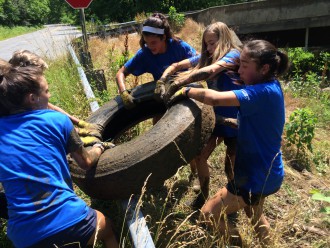
In response, the Mountain Valleys Resource Conservation and Development Council and the Madison Soil & Water Conservation District developed a plan for the Ivy River Watershed in 2013, identifying potential sources of pollutants and establishing a strategy for ensuring clean water, says Hughes. Ivy River Partners was formed in 2014 to carry out that plan.
“We form partnerships and build bridges in the community to bring people to the table who have a vested interest in water quality,” Hughes says. “From there, we work on projects such as agricultural and stormwater BMPs [best management practices], septic and stream repairs, education, and river cleanups.” The results so far have been both impressive and eye-opening. “We have hauled out 18,460 pounds of trash from the waterways,” Hughes says, including car batteries, newspaper dispensers and a washing machine.
Currently, Ivy River Partners are working with Madison County middle school on its Kids in the Creek program, which ties education on water quality in with cleanup. The group also offers a limited range of services for farmers and residents seeking to improve their land and mitigate erosion and contaminant issues. Hughes encourages residents to check out www.ivyriverpartners.org to see if they qualify for services.
Lending a hand
For those interested in lending a hand, opportunities abound. RiverLink, MountainTrue and Asheville GreenWorks host a variety of volunteer opportunities throughout the year, including the annual Big Sweep, a watershedwide cleanup scheduled this year for Saturday, Sept. 9.
The Environmental Quality Institute, meanwhile, holds training workshops each spring and fall for prospective participants in the organization’s programs, and encourages residents to contact local agencies across WNC to see what work needs to be done in their own neighborhoods. Financial support for the nonprofit agencies working on the river is always welcome, adds Traylor. “The state does not have the resources to adequately monitor North Carolina’s waterways, and probably never will, so having a grassroots system in place is essential,” she notes.
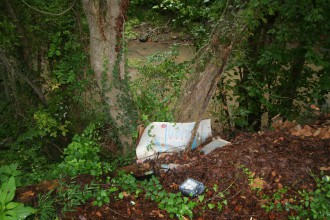
The future hopes of the French Broad depend on a continued, concerted and collaborative effort across the watershed, says Bradford. “This is the bass of the symphony,” he says. “The French Broad River is an asset to the region, not only because it’s an economic driver, but because it’s part of the cultural identity for the region. And it’s something we need to continue to cherish and protect.”


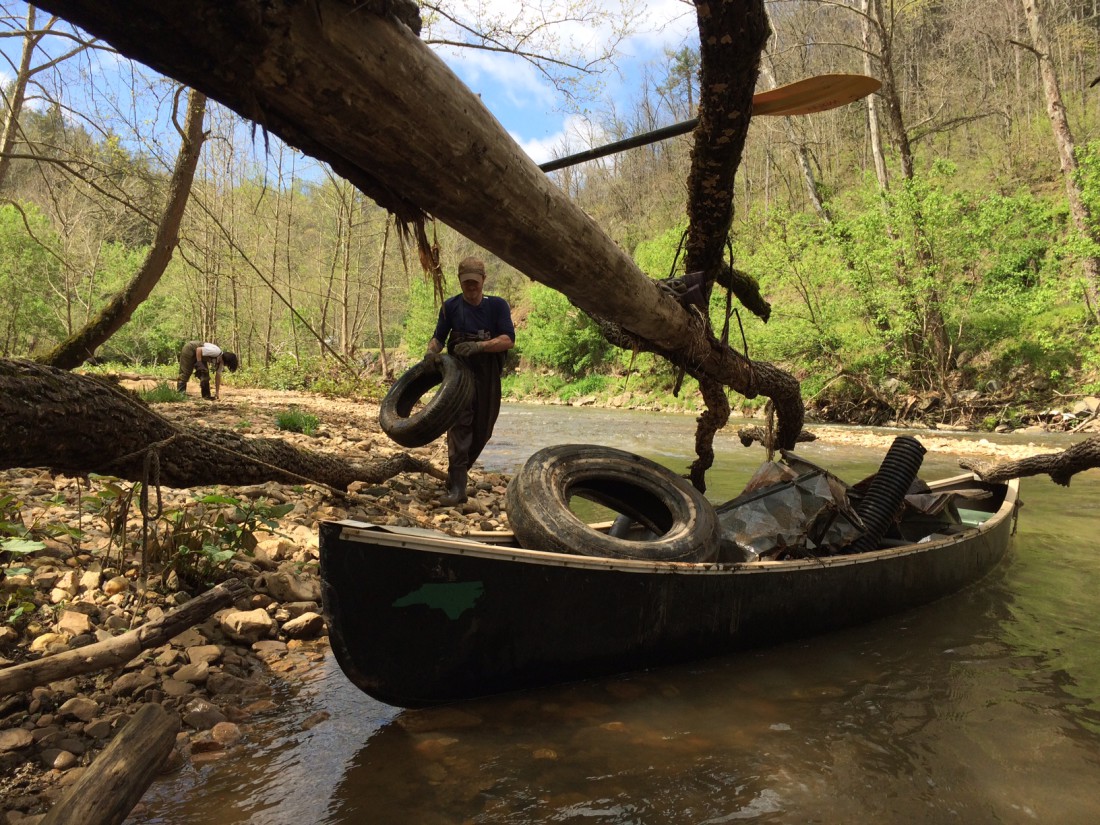
Great article, Max – but with one serious omission. Clean Water for North Carolina is a major advocate on issues that affect water quality throughout the State, including having an office here in Asheville. Check out their website & see all the aspects of the issue that they fight hard on:
http://cwfnc.org/
Thanks Barry! I appreciate you reading and sharing that info about CWFNC. I actually did communicate with Clean Water, who was extremely helpful in putting me in contact with GreenWorks, The Environmental Quality Institute, and other local entities doing awesome work in the FB watershed. But agreed, on a statewide level, CWFNC is also doing great things and is definitely worth noting.